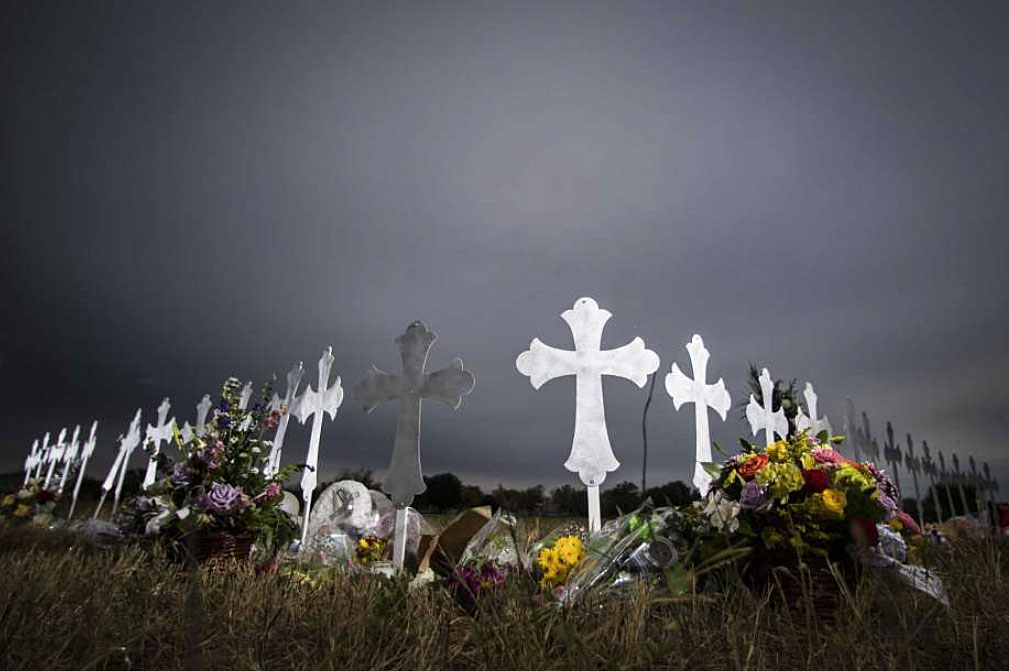Twenty-six crosses have been placed near a ballpark representing the 26 lives lost during a shooting in the First Baptist Church of Sutherland Springs, Sunday, Nov. 5, 2017. Photo: Marie D. De Jesus, Houston Chronicle
By St. John Barned-Smith, John D. Harden, and Keri Blakinger | November 10, 2017 | Houston Chronicle
Attacks show how such crimes aren’t isolated to families.
The mass shooting in Sutherland Springs last week left America shocked, searching for a cause, something to explain the brazen slaughter of 26 people as they prayed.
They wondered what could have possessed Devin Patrick Kelley, the 26-year-old disgraced airman identified as the shooter, to act with such cruelty.
One factor that surfaced early in the investigation – a chaotic past of domestic abuse and violence – has proved all too common in Texas in recent years.
Domestic violence cases have risen sharply across the state, with more than 210,000 wives, girlfriends, husbands and others suffering death or injury at the hands of a family member in the past two years. More than 550 wives or girlfriends were killed by a domestic partner between 2012 and 2016, according to state figures.
“We continue to underestimate the reach and devastation of domestic violence,” said Gloria Aguilera Terry, chief executive of the Texas Council on Family Violence. “Domestic violence thrives in the silence and obliviousness we give it. Only when we confront the very conditions which allow domestic violence to exist will our homes, public spaces and places of worship be truly safe.”
For Stephanie Johnson, the explosion of violence last Sunday in Sutherland Springs felt all too familiar.
Johnson’s daughter was found dead last year in her ex-husband’s Galveston County home, weeks after vanishing on her way to pick up her son.
Johnson had watched her daughter suffer for years.
“When she went missing, I knew immediately that she was dead,” she recalled.
The shooting in Sutherland Springs followed what investigators called a “domestic dispute” between Kelley and his wife’s family, including a series of threatening texts Kelley sent to his mother-in-law before the shooting.
It wasn’t the first time Kelley turned to violence. He was court-martialed in 2012 and thrown out of the U.S. Air Force after assaulting his wife and step-son so severely that he fractured the child’s skull. He also was accused in 2013 of abusing the young woman who would become his second wife.
Across the nation, more than half of the mass shootings between 2009 and 2016 were related to domestic or family violence, according to a recent study from Everytown for Gun Safety, a nonprofit that advocates for more regulation of firearms.
Families Wiped Out
Law enforcement agencies in Houston and across Texas have likewise confronted a rising number of domestic violence cases in recent years, according to the Houston Police Department and the Texas Department of Public Safety.
In the first 10 months of 2017, HPD received about 24,300 reports of domestic violence, a 45 percent increase over a similar period in 2013, according to Capt. David Angelo, who oversees the Special Victims Division.
The department operates a special victims division and posts special crimes officers at women’s shelters across the city to help victims report domestic violence cases more easily, he said, calling domestic violence investigations an “absolute priority.”
“We recognize a husband who batters his wife may be a murderer tomorrow,” Angelo said.
The court-martial wasn’t the end of Kelley’s problems.
After pleading guilty to beating his wife and stepson, he made death threats against his military chain of command and smuggled weapons into Holloman Air Force Base in New Mexico, where he was stationed. His year of military confinement included a stint in a mental health facility, from which he escaped briefly.
Later, after returning to his family’s home in New Braunfels, the Comal County Sheriff’s Office responded to a call that he was abusing his girlfriend, but deputies concluded the incident was “teenage drama.” He married her two months later.
Authorities are still investigating the Sutherland Springs massacre, but advocates say is it is just one of the latest – and most extreme – examples of how domestic violence cases often spill out of private homes and ensnare family, friends and innocent bystanders.
“It happens across every segment and sector of our society,” said Andy Kahan, victims’ advocate for the city of Houston. “You can’t pigeonhole it.”
Domestic violence shootings have exacted a terrible price in Harris County, wiping out whole families in recent years.
Three years ago, Ronald Lee Haskell traveled from California to Houston in search of his ex-wife, Melannie Lyon, authorities said.
Authorities had charged him with assaulting her in 2008 in Utah and again in October 2013. Judges issued protective orders in both cases.
That didn’t deter him, authorities said. On July 10, 2014, he allegedly walked into the home of his ex-wife’s relatives, looking for Lyon. He never found her.
Instead, he found Lyon’s sister, Katie Stay, along with her husband and their five children, authorities said.
Police said Haskell ordered the family to lie face down, then tied them up and shot them, killing all but the family’s oldest daughter, Cassidy.
Haskell – who faces capital murder charges – is currently in Harris County Jail awaiting trial.
A year later, Harris County sheriff’s deputies making a welfare check in north Harris County found a scene of similar carnage.
Inside the home, they found Valerie Jackson, her husband, Dwayne, and six of their children, all shot to death.
They arrested David Conley, Jackson’s ex-boyfriend, with whom she’d had a yearslong abusive relationship that led to at least two protective orders.
Conley, too, is charged with capital murder and remains in the Harris County Jail awaiting trial.
And in 2011, 27-year-old Jose Avila-Alva in Matagorda County shot his wife and four children before turning the gun on himself. He killed his three sons, ages 5, 4 and 3, and his 2-year-old daughter; only his wife survived.
Despite law enforcement’s best efforts to curb the violence, the deaths continue unabated. The Harris County Institute of Forensic Science recorded 229 domestic violence homicides from 2010 to 2016, or an average of 31 homicides a year.
Of those, at least 22 – about 10 percent – were relatives of the main victim.
‘Deadly Combination’
Amanda Johnson, with the Dallas chapter of Moms Demand Action for Guns Sense in America, said the shooting underscores the need for smarter gun laws.
“People violent enough to be violent enough with their own children and spouses are also violent enough to commit mass murder,” she said. “When they have easy access to these weapons, it’s a really deadly combination.”
She and other advocates hope the Sutherland Springs shooting will spark a national dialogue, particularly with the daily abuse many women face that doesn’t draw the same scrutiny as a mass shooting.
“Up until now, the media would lose interest in a shooting once they found out it was a domestic violence incident and not a ‘real’ crime,” Johnson said. “Sutherland Springs is a game-changer.”
Sherri Kendall, CEO of Aid to Victims of Domestic Violence, said approximately 1 in 4 women experiences domestic violence at one point or another.
“While we are seeing a number of multiple homicides with domestic violence in the timeline, it is happening all the time,” she said. “We have to learn something from it. When this story is over we have to continue to be vigilant in our communities to make sure there are services for survivors and for perpetrators.”
The Sutherland Springs shooting highlighted the need to ensure domestic abusers can’t possess firearms, advocates said.
“This man had a history of abuse, and he should not have had access to a firearm, and we are advocating for stricter gun laws when it comes to being the hands of convicted abusers,” said Chau Nguyen, chief marketing officer at the Houston Area Women’s Center. “If we don’t take action, we’re going to see this as a recurring reality in our lives – and we know the link between domestic violence abusers and mass shooters.”
Investigators also are examining how Kelley obtained the four firearms he bought in the years before the shooting. Under federal law, anyone convicted of even misdemeanor domestic abuse is prohibited from buying guns from licensed firearms dealers, although loopholes do allow them to purchase weapons at gun shows or from individuals.
Kelley was convicted of assault through a military court and could have faced up to five years in prison. That alone should have disqualified him from purchasing the weapons. In the days after the shooting, however, the U.S. Air Force acknowledged officials had failed to enter his conviction into any of the databases used by the National Instant Criminal Background Check System. The Air Force announced it is conducting an internal audit to figure out what happened and if records in other cases were correctly entered into the database.
Instead, he was able to purchase the Ruger AR-556 at a San Antonio Academy & Outdoors store in 2016 by clearing a federal background check.
In Sutherland Springs, family and friends are just beginning to process the grief. The victims ranged in age from 1 to 77 and included an unborn child.
Most of the church’s members were killed or injured in the shooting.
‘It Wasn’t Enough’
 Stephanie Johnson is still struggling, a year later, with the loss of her daughter, Anne-Christine.
Stephanie Johnson is still struggling, a year later, with the loss of her daughter, Anne-Christine.
Investigators found Anne-Christine’s decaying body in the garage of her ex-husband, Shaun Philip Hardy. She’d been stabbed and suffocated.
Hardy is free on bail awaiting trial.
The two had a troubling history of domestic violence, court records show. In the summer of 2015, the young mother of two accused Hardy of pointing a loaded shotgun at her, slamming her head into a wall and threatening her with a knife. Johnson didn’t sever her relationship with the man, however, because of her younger son, according to family and friends.
“She was a fearless mother going back to save her child,” co-worker Jen Elkins said at the time.
But on Dec. 30 of last year, investigators found Johnson’s body in the garage of Hardy’s home – wrapped in plastic and surrounded by candles.
In the year since her daughter’s death, Stephanie Johnson has become a tireless advocate for battered women, trying to help other women avoid similar fates.
“There’s a perception that domestic violence is just something that’s isolated to a family unit,” she said. “But the problem with viewing it through this lens is it doesn’t anticipate the enormous impact that the crime has.”
She still wonders what she could have done differently.
“I did everything I could, and it wasn’t enough,” she said. “It seems really simple when you’re on the outside.”

